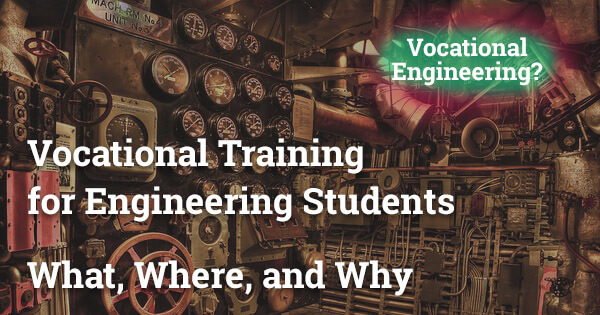
Whether you are a recent graduate still deciding on what career path to follow or you have been working for a number of years but want to do something different, vocational training for engineering students may be what you are looking for.
This is an area that will suit someone who wants to go into a field that pays well.
Artisans in engineering trades are well paid for the simple reason that they possess a scarce skill.
In the United States, vocational schools have been a popular choice for a number of years.
Someone considering a course in engineering should consider the following aspects in detail:
- Why engineering is a trade you want to learn.
- What subjects you need to have to be accepted.
- What to look out for when choosing a vocational school.
- Which subjects you are going to be doing.
- Where you can find the right schools.
- Where you can look for funding to support your training.
Article Table of Contents
Why Choose a Vocational College
Before you chose a vocational school, you will need to ask yourself why this is a good option for you.
This kind of school is right for someone who would rather study for a qualification that focuses more on practical subjects rather than theory.
Vocational schools work with the market so that the subjects they teach align to the needs of the industry.
This is the reason why many students leaving a vocational school do not usually have a problem finding jobs.
The Job Market Monitor indicates that in 2014 there were almost 600,000 jobs that remained vacant due to a shortage of skills.
Students graduating from these colleges are more likely to transit faster through the workplace.
They are also more likely to get a permanent job when compared to students graduating with academic degrees.
Some vocational colleges will also offer a degree transfer program.
This means that you can transfer some of your college credits when you want to proceed to a 4-year university or college.
When you eventually do a degree, you benefit from both a practical and theoretic education.
What You Need To Look Out For When Selecting a Vocational School
The National Centre For Education Statistics estimates that there are over 300 vocational schools in the United States Of America.
This can make it difficult for a prospective student to choose the right one.
Below are some of the things you should consider when looking for a good school:
The Cost
You may want to go to a certain college but if you are unable to afford the tuition, you will not be able to study.
It is important for you to ensure that you have the details related to all the costs involved.
College costs can include registration fees, books, and other equipment.
Knowing how much you need to pay will also assist when looking for financial assistance.
Assistance With Placement
A good vocational college will have an office that helps students to find work in the industry.
When considering a college, ask about the percentage of graduates who get placed in jobs.
You can also do your own research with graduates from the school who are already in the workplace to find out if the school assisted them with job placement.
Facilities
A vocational college should give you the required skills needed in the industry.
If it uses obsolete equipment which belongs to an era gone by, it will not help you when you get into a job.
Most companies in America use modern state of the art equipment.
A good vocational college should have up-to-date facilities.
Completion Rate
The number of students completing their studies at a particular college can tell you how much the college is committed to the success of its students.
Find out what the retention rate of the college you are planning to go to is; compared to other colleges.
Extra Services
Good colleges do not only offer training, they also have other extra services.
Ask if the college has a student advisory office offering career guidance.
Are there any counselling services for students struggling due to personal issues?
Subjects You Need
Selecting the right subject while you are at school is something that can be confusing but which you should approach with care.
This means that you need to decide what your career path is going to be so that you can select the right subjects to allow you to follow that path.
Engineering can be broken into different subjects.
Examples are Civil, Mechanical, Electrical, Production, and Mining.
However, no matter which aspect of Engineering you will want to do, you will need to have Mathematics and Science.

These are not the easiest subjects in the school curriculum but the hard work you put into them will eventually pay in the long run.
Taking the easy subjects may be easy and give you instant gratification but you are certainly not thinking long term.
Apart from Mathematics and Science, you will also need subjects such as Engineering and Technology.
The advantage with Mathematics and Science is that they are highly regarded and can widen your choice later on in life.
Even if you decide not to study engineering, these subjects can allow you to take other career paths.
Where Students Can Go To Find Vocational Training For Engineering
You can find an engineering vocational school in your area by asking someone who has done this type of training.
A career in engineering is an exciting one. However, to study it requires perseverance, creativity, and hard work.
The rewards you get in the long term are often worth all the hard work.
As indicated in this article once you have graduated with an engineering qualification getting a job is much easier as the manufacturing industry in the United States is currently running a shortage of skills in this area.
Frequently Asked Questions
Is engineering a vocational course?
There are a lot of levels to engineering and a lot of different kinds of engineers.
Even so, engineering starts as a vocational course.
Engineers invent, design, build, and test machines and systems.
This can apply to almost anything.
You can definitely start your engineering education with a vocational course and go from there.
What courses should an engineering student take?
Math and physics will give you a solid foundation for studying engineering, regardless of the kind of engineering you are studying.
Additionally, algebra, geometry, calculus, and trigonometry are all classes and things you need to understand to become an engineer.
Computer skills are also needed for further engineering work.
Which engineering is hardest?
A chemical engineering degree is likely the hardest degree to get in the engineering field.
You must have an in-depth knowledge of chemistry, which is no easy task.
The classes have a lot of homework and more prep time than other areas of engineering.
How much does vocational training cost?
What you are studying, and where, has a lot to do with how much a vocational education will cost.
Some programs take two years and will cost you around $33,000.
Other certifications, like massage therapy, will cost around $4,000.
Locksmiths can get certified for as little as $1,000.
Taking these classes online will lower your costs.
Are vocational schools profitable?
There are for-profit and not-for-profit vocational schools.
The ones for profit are run by private organizations, and many offer online options, and they stay in business so they must be making money.
State-funded schools are not meant to make a profit, and they would not survive if not for government funding.
Why vocational education is important?
Vocational education is important because it helps get people qualified for jobs, and it helps provide workers for businesses and corporations.
It bridges the skill gap between work and education.
Vocational schools provide the skills needed to start working immediately in a specific area.
Academic schools offer a wider education, which qualifies you for a general field of work.
Vocational all engineering line.
I have been considering going to school for engineering since it was a path my grandfather took and he did very well for himself.
I just graduated this year and was taking the summer off. I intend on enrolling in early 2020.
After checking the cost differences between these kinds of schools and colleges, I question why anyone other than doctors or lawyers would bother going into debt for them!
So a vocational school is basically a trade school right? I mean around here, I never hear of anyone calling these types of schools that. Either way, I am considering getting training to become an engineer and your article here was super helpful for me. Answered most of my questions. Thanks a lot!
Thanks for the key points about what to look for in an engineering school, this is exactly what I was looking for.
Cheers!